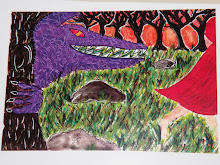What do we make of how the Match-Girl uses her fantasies? Carl Jung made a great deal about the value of imagination. He even developed a technique he came to call active imagination—this was his method for exploring and assimilating unconscious contents. Jung also makes a great deal about the importance of regression and its finalistic purposefulness in progression. Both of these are different to what the Match-Girl is doing and how she is using her fantasies. We can speak of a regressive movement in her “fantasying,” yet the regression is not in service to the individuation impulse. Rather, her “fantasying” keeps her stagnant since the meaning is not discerned. Hence the images are not symbols which are capable of moving libido. The libido expended simply dies out.
D.W. Winnicott also has something to say about the “difference between fantasying and dreaming." For Winnicott dream is related to object-relating in the real world…"by contrast…fantasying remains an isolated phenomenon, absorbing energy but not contributing-in either to dreaming or to living…fantasying interferes with action and with life in the real or external world, but much more so it interferes with dream and with the personal or inner psychic reality, the living core of the individual personality.”
Sunday, January 3, 2010
Friday, January 1, 2010
The Little Match-Girl, Mother's big "slippers"
I want to comment on the imagery of Mother's big "slippers" in the fairy tale, The Little Match-Girl:
Imaging a slipper, a “light, low-cut shoe” that easily slips “on or off the foot.” Its not much protection in the snowy, cold weather, and then it doesn’t hold fast but slips easily off the foot. Consider also the play on words, what is a “slipper.” An intra-psychic slipper might be an aspect of ourselves that doesn’t hold fast, doesn’t grab hold. It comes into consciousness only to be lost rather quickly as it slips away. Slippers are aspects of ourselves that slip easily away from consciousness, aspects of ourselves without much constancy.
How do we translate this psychologically? We might say that the Match-Girl’s relationship to the ground, the reality principle, is slippery and that somehow it is related to her mother, perhaps part of a mother complex. She hasn’t received shoes that would provide sturdy and constant support for “taking possession of the ground,” in other words, she has not received the proper tools that would allow her to find a proper relationship to the world about her, but instead has received shoes that prove too inconsequential to be of much support in this manner, and shoes that slip off easily—a sort of inconstant (perhaps inconsistent) aid in the Match-Girl’s ability to relate to the ground, i.e. the world about her. Remember, The Match-Girl engages in fantasy to fulfill important needs.
Imaging a slipper, a “light, low-cut shoe” that easily slips “on or off the foot.” Its not much protection in the snowy, cold weather, and then it doesn’t hold fast but slips easily off the foot. Consider also the play on words, what is a “slipper.” An intra-psychic slipper might be an aspect of ourselves that doesn’t hold fast, doesn’t grab hold. It comes into consciousness only to be lost rather quickly as it slips away. Slippers are aspects of ourselves that slip easily away from consciousness, aspects of ourselves without much constancy.
How do we translate this psychologically? We might say that the Match-Girl’s relationship to the ground, the reality principle, is slippery and that somehow it is related to her mother, perhaps part of a mother complex. She hasn’t received shoes that would provide sturdy and constant support for “taking possession of the ground,” in other words, she has not received the proper tools that would allow her to find a proper relationship to the world about her, but instead has received shoes that prove too inconsequential to be of much support in this manner, and shoes that slip off easily—a sort of inconstant (perhaps inconsistent) aid in the Match-Girl’s ability to relate to the ground, i.e. the world about her. Remember, The Match-Girl engages in fantasy to fulfill important needs.
Subscribe to:
Posts (Atom)
